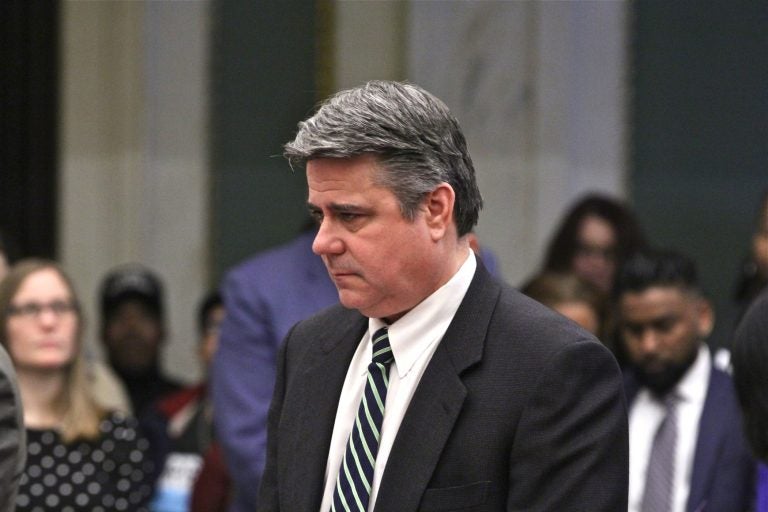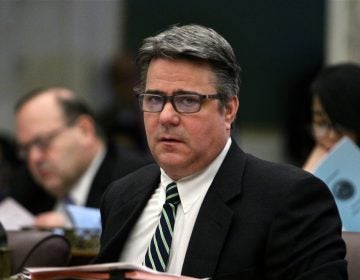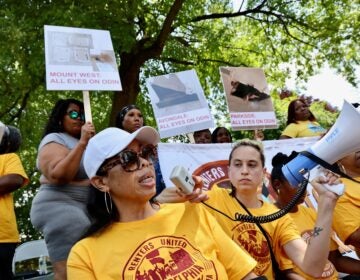Prosecutors say Bobby Henon helped PPA in exchange for windows given to his girlfriend
Federal prosecutors began Tuesday to present evidence that Councilmember Bobby Henon was bribed to oppose an audit of the PPA.

Philadelphia City Councilmember Bobby Henon. (Emma Lee/WHYY)
Updated at 7:27 p.m.
Prosecutors in the federal corruption trial of City Councilmember Bobby Henon began Tuesday to present the evidence behind their allegation that Henon was bribed to oppose an audit of the Philadelphia Parking Authority’s finances and operations.
The allegation is grounded in a June 2016 City Council resolution asking then-City Controller Alan Butkovitz to launch an audit focusing on the PPA’s revenues from parking meters, parking tickets, and fines on drivers caught by the city’s red-light enforcement program.
After testifying before council on the resolution, then-PPA director Vincent Fenerty angrily phoned his old friend Henon to complain about the proposed audit, introduced in council by Councilmembers Helen Gym and David Oh. Fenerty considered the resolution unnecessary and a political attack on Joseph Ashdale, who served as PPA board chairman at the time.
Oh “hates Joe Ashdale’s guts, he hates my guts,” Fenerty told Henon on a wiretapped phone call played in court. “Helen Gym ran against the Parking Authority to win her seat. Now she is pulling it again, and she says we don’t know how to budget.” The PPA is required to send a portion of its revenues to the Philadelphia School District.
“I don’t f***** mind an audit at any time, but we get audited every year. This is just a ‘let’s f*** with the Parking Authority’ issue,” Finnerty said. “We got to line nine [council] votes up against it and spank this f****** David Oh. He’s being a pain in the a** to us, he is being a pain in the a** to [Mayor] Jimmy [Kenney].”
Ashdale “is flying off the handle” over the audit, he said.
Henon vowed to help but fretted about the politics of opposing an audit of the PPA, an agency that is unpopular with the public and perceived as a Republican patronage mill. While Democrats dominate city politics, the Republican-led state legislature has controlled the PPA since 2004 and places Republicans in the agency leadership and many jobs.
“I am just trying to figure out how I publicly come out and vote no,” Henon said. “I’ll do anything for Joe, and I’ll vote no, and I will try to squash it.”
Prosecutors alleged Ashdale later bribed Henon to work against the council resolution, arranging to provide free windows at the home of Henon’s chief of staff, Courtney Voss, with whom Henon was in a relationship at the time. Ashdale heads District Council 21 of the International Union of Painters and Allied Trades, which represents glaziers (window installers), painters, drywall finishers and other workers. He has not been charged.
Henon denies the allegations. During the trial’s opening arguments three weeks ago, his attorney noted that Henon and Ashdale were longtime friends and rejected the accusation that the windows were a bribe. In addition, the significance of the council resolution has been questioned as it did not require Butkovitz to launch an audit.
The charges related to the PPA are among the few in the trial against only Henon and not his co-defendant, electricians union leader Johnny “Doc” Dougherty. Dougherty is accused of bribing Henon to influence legislation and take other official actions, including pressuring Comcast and Verizon to make concessions to local construction unions.
Several days of testimony about Dougherty’s dealings with Comcast wrapped up Tuesday with the questioning of Mark Reilly, senior vice president of government and regulatory relations for Comcast’s northeast division.
Jurors heard more about a December 2015 meeting in Henon’s office during which Dougherty suggested he might exercise his influence in Council to block approval of the renewal of Comcast’s cable TV franchise in the city.
The telecommunications giant had already made concessions to Dougherty, including agreeing years earlier to hire only union contractors to run cable inside commercial buildings and to pay them higher wages than non-union contractors receive. In November 2015, Comcast also agreed to give more work to MJK Electrical, a union electrical firm favored by Dougherty and Henon.
But at the meeting, a day before a crucial council committee vote, Dougherty demanded and Reilly agreed to more concessions so that the union leader would tell his council allies to let the bill proceed.
“We reached a deal on terms. It’s all about the unions and Johnnie Doc,” Reilly wrote in an email to another Comcast executive. “The… demand made is that we agree to have all commercial construction in the public right-of-way go to the unions. I [asked] if [their rates] are going to be competitive. They said they’d be competitive (lie).”
“I have sent Doc our rate card for construction. He is going to get back to me. If we don’t agree, he controls the votes to deny. Awesome day!” he wrote.
“Either we agree that all row commercial business goes to unions or he stops the renewal,” Reilly wrote in another email. “This was told to me in the office of [Henon,] the Chairman of the Public Property Committee with [Henon] sitting at the table barely uttering a word. I am feeling the brotherly love.”
Dougherty’s attorney Henry Hockeimer noted that while Comcast did agree to start considering bids from unionized firms to lay cable in city streets, despite the higher rates they charged, the agreement still set relatively low wages for the work.
Dougherty “whined about how low they are. He understands,” Reilly wrote in an email. But “he also got business for his boys that [previously] wasn’t coming his way.”
Republican vs. Republican
The testimony on Tuesday afternoon delved more deeply into the politics surrounding the proposed performance audit of the PPA, which would have gone further than a standard financial audit by examining the parking agency’s policies and practices.
The dispute pitted Councilmember Oh, a Republican, against the Republican-led agency. Ashdale, the PPA board chair at the time, contended that Oh was driven by anger over the city party’s refusal to support him in both of his council elections. During Oh’s reelection race the previous year, party officials had thrown their support behind candidate Dan Tinney.
“It’s pure politics. He is mad that … people in the Republican party didn’t get behind him, ’cause we were doing Tinney, remember?” Ashdale told Henon on a wiretapped phone call.
After Council held a hearing on the audit resolution in June 2016, most members other than Oh were willing to drop the audit request. Council President Darrell Clarke, making one of his few appearances on a wiretapped call so far, acknowledged “problems” at the PPA but said he was “pissed off” that Oh had dragged the rest of council into an intra-party fight.
“He’s bringing this political s*** in our chambers, you know, it’s like, what the f***, man. We got enough stuff to do,” Clarke told Henon.
At the same time, he said he sympathized with Oh for going after his opponents in his own party. “Look, they took their shot to try to knock him out, threw the kitchen sink at him twice, and he f****** beat ’em,” he said.
Clarke wanted to table the bill, effectively burying it, rather than hold a council vote that would draw attention from the press and inconvenient questions. Henon agreed but struggled in a series of phone calls to convince Ashdale. The PPA chair fiercely criticized Oh, Gym, Butkovitz, and Clarke — and asked Henon to call for a vote on the bill in which it would be defeated by a wide margin.
Henon also spoke with Dougherty about the resolution, asking him how to manage the opposing wishes of Clarke and of his good friend Ashdale. Dougherty counseled Henon to support Ashdale as a way to win support among voters who are union members, particularly Teamsters upset by Henon’s support for a proposed sweetened beverage tax.
“Ashdale is the loudest f****** building trades guy the Teamster has in Northeast Philly,” Dougherty said. “Bob, you just keep the base. You can’t ever get … in trouble if you keep the base close.”
As Henon discussed the audit bill with Ashdale, they also talked about the windows on Voss’ home. Henon told Ashdale she needed insulated glass, that the window dimensions were either a half-inch or 5/8 inch, and that she lived in a historic home, while Ashdale said he had talked with a New Jersey company about obtaining the windows quickly.
On one call in late June, after the audit resolution had been tabled, Ashdale mentioned that he had given Henon the maximum campaign contributions allowed by city law and then said he would cover part of Voss’ window repair costs. “We are going to pay for the material and then she will just pay for the labor,” Ashdale said.
“Oh, great,” Henon responded.
Ashdale’s concern that tabling the audit bill would not kill the measure turned out to be partially justified. The legislation was “untabled” in September but then finally voted down, FBI agent Jason Blake told the jury.
The trial is taking place two years after federal prosecutors brought a sprawling 116-count indictment against Henon, Dougherty, and several people with ties to Local 98. The charges have been split into two trials, with the current case focusing on the bribery charges against Henon and Dougherty. It is expected to last one to two more weeks.
Disclosure: The Electricians Union Local 98 represents engineers, camera personnel, editors, audio and maintenance techs at WHYY.
WHYY is your source for fact-based, in-depth journalism and information. As a nonprofit organization, we rely on financial support from readers like you. Please give today.









